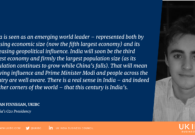India’s G20 Presidency is symbolic of its rising global influence
India is a country on the up. In the last several decades, the country has made remarkable, world-leading strides in development and economic growth. In that time, millions have been pulled out of poverty, literacy rates have risen dramatically (from 18.3% in 1951 to 74.4% in 2018), and India recently became the world’s fifth largest economy. It is on course to become the third largest economy very soon, based on projections of average growth rates of around 6-7 percent year on year, which make it the world’s fastest growing major economy.
As well as the economic and developmental strides that India has made, it is also seen as an increasingly important and influential actor in geopolitics. Put simply, what India does matters, and countries and organisations around the world are taking note. We saw it clearly in the pandemic when India’s role as the world’s pharmacy put it front and centre of the global response. We’re seeing it in the increasing investment arriving in India, looking to access the growing market and utilise India’s huge talented population and innovation. And India’s energy transition and climate credentials are and will be of utmost importance in the battle against climate change.
It is, accordingly, very timely to see India take hold of the G20 Presidency this year.
An economic powerhouse already, and rapidly rising, India is, at the same time, still developing. To mark its 75th year of independence, the Government of India recently set the target to reach developed country status by 2047 – exactly 100 years after independence – namely, raising GDP per capita, high level of infrastructure and high quality of life for all Indians.
This combination of developed and developing is unique and puts India in a position where it can help to bridge the developed and developing worlds.
At the macro level, India is comparable to the developed world – the 5th largest economy as already touched upon, the world’s third largest defence budget, a national space agency, a welcome seat at most multilateral and bilateral forums, with calls for a seat on the UN Security Council for instance, and foremost in the minds of global investors and business leaders. On the other hand, in some districts, India faces challenges in scaling its education and healthcare, and in entirely eliminating poverty.
The relationships and experiences that India therefore shares with countries around the world is truly unique – a valued partner to countries of the G7, and a voice for the developing world.
The theme of India’s Presidency is embodied by the slogan “One Earth, One Family, One Future”, and will see India host over 200 meetings in over 50 cities across 32 different workstreams, such as digital technology, financial inclusion and sustainability. These areas have all been a big part of India’s development and continue to be crucial.
Digitisation has been a backbone of India’s progress. The proliferation of the internet has helped to make information and education more widely available, helped business owners to grow and modernise, and brought many into the banking system for the first time.
The more inclusive financial system has enabled more businesses, particularly the more-excluded SMEs, to receive necessary funds and loans to establish and grow, and makes it easier for consumers and businesses to do business. It’s also emblematic of India’s focus on inclusion as it develops.
And on sustainability, India is on a huge investment drive to improve the country’s interconnectivity, expand renewable energy, and work towards achieving Net Zero, to which, it committed in 2021. It’s also the founder of the International Solar Alliance and is innovating in other key areas to the transition like electric vehicles and green technologies.
So, tying all these together and more, it is both fitting and deserved that India should take up such a leadership position as President of the G20; after all, it is the world’s largest democracy, fastest growing economy, and hub of innovation. We look forward to the New Delhi summit in September and engaging with various strands of activity in the run up taking place across this remarkable country.

 By Kealan Finnegan
By Kealan Finnegan 


